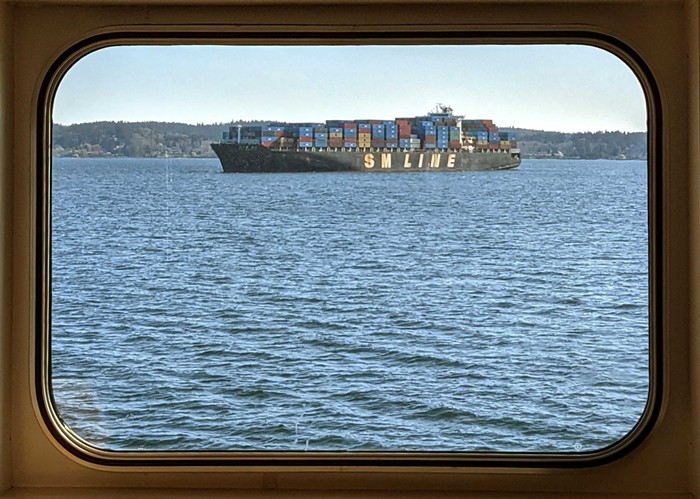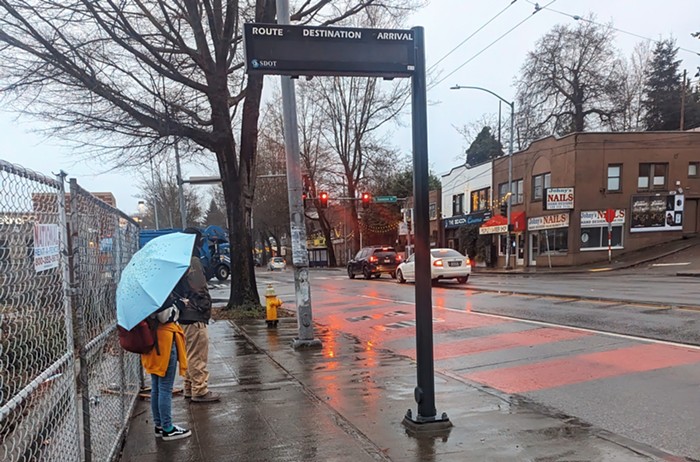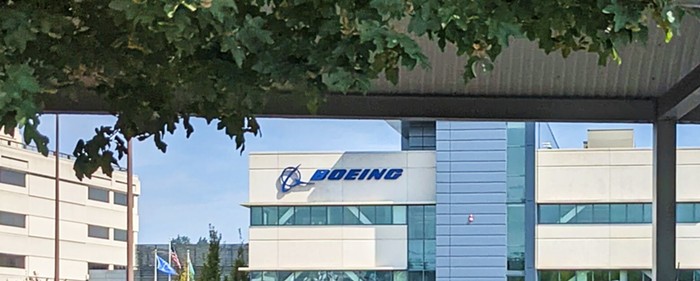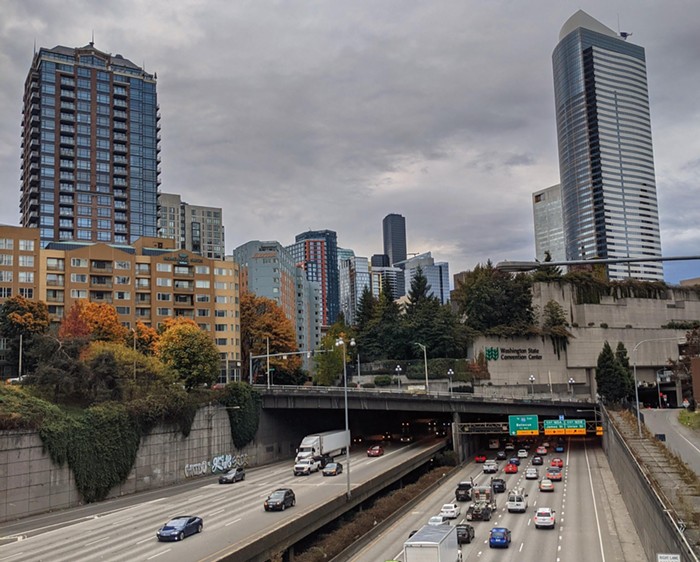One of the reasons I find it hard to leave Twitter, which is run by a white African who also happens to be the richest person in the world but is still stuck in what Fela Kuti called "colonial mentality," is tweets by one of Seattle's leading transportation activists, Ryan Packer. They have made it a mission to tweet any collision that involves a pedestrian/cyclist/scooterist and a car. For example, they tweeted on March 12 that a person was hit on Beacon Avenue South and South Spokane Street. The person was 70 and, according to Packer, "transported to the hospital with major injuries." This incident didn't make a single local news item, let alone a headline.
I'm familiar with this intersection, and crossing it, as I often do, always requires ending whatever dream has fancied my walk down the pedestrian-safe sidewalk between Seattle Veterans Hospital and Fire Station 13, and focusing on the cars, which, for reasons that have yet to be properly determined, are in a state that makes no room for patience. They want to move and move right now. I have never crossed this street without a triple-check. These drivers just don't give a fuck. It's down to you or them. And they have the power to kill you.
Seattle Fire just responded to a driver hitting a pedestrian on Beacon Ave S south of S Spokane Street near Jefferson Park. The approximately 70 year old pedestrian is being transported to the hospital with major injuries. pic.twitter.com/1Qzz2qMvBR
— Ryan Packer (@typewriteralley) March 12, 2023
Follow Packer and you will get a sense of how lawless our city is. Drivers are daily hitting people on their feet, on a bike, on a scooter. But this lawlessness is simply permitted. You can't sleep on the street without making the news, but you can constantly break the vehicle laws with near impunity. This is no exaggeration. Indeed, anyone who walks the city as I do has to accept it as a matter of fact. Cars charge down Martin Luther King Jr Way or Rainier Avenue with no fear all of the time. A red light can't be trusted here and elsewhere in the city. You must make sure the cars have come to rest before entering an intersection. And, to make matters more stressful, you have to make sure that cars behind the ones at rest are slowing down. Sometimes they don't.
But what do we read about in the mainstream papers? Tips are too high ("One Seattle business is taking a stand against tipping mania"); or the homeless people ruining everything imaginable ("Inslee meets with frustrated parents of Seattle school near Ship Canal Bridge encampment"); and so on. My question is: Why is public safety monopolized by concerns over petty crime, homeless camps, and the abandoned paraphernalia of heavy drug use? The other day "A 50-year-old man was killed Feb. 28 after the vehicle he was driving fell 40 to 50 feet off an overpass in Seattle." The police suspected speeding was involved. Ah duh.
But this spectacular incident had zero political force. It was just an accident that happened to cause the kind of traffic jam that packs in each driver the dynamite for car rage. And besides, the crashes that make the a-political headlines are far, far, far from the whole picture.
Where am I? @Spottnik https://t.co/RG8VdvCzj4 pic.twitter.com/WNeoeb7SAJ
— suresh.com (@suresh_dot_com) March 10, 2023
What this city/state-sanctioned lawlessness reveals is something that only I picked up on during the lockdown: the social (or what I call the cultural) domination of necro-economics. The idea was first theorized by the Cameroonian philosopher Achille Mbembe in response to Michel Foucault's theory of biopolitics (“...life and its mechanisms [brought] into the realm of explicit calculations and made knowledge-power an agent of transformation of human life”). Mbembe argued, as a subject of the colonial mentality, that death is very much a part of a state's calculations and knowledge-power for the management of a capitalist society. The LA-based philosopher Warren Montag extended Mbembe's critique of Foucault from politics to economics. Capitalism must not only manage the life of a population but also (and maybe even more importantly) its conceptions of death.
We did not beat COVID. We just accepted the economy was more important than the deaths it caused. The same goes for the permitted lawlessness of cars. Their economic importance is way above the death and destruction they cause. The work of the State and City has been to make this death and destruction more normal than, say, a person sleeping on the street or the mania for tips.




















